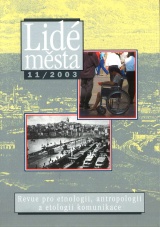Fenomén žebrání v Praze
Etologická analýza
DOI:
https://doi.org/10.14712/12128112.4311Abstrakt
Ethological observations of beggars were in Prague in 1999-2000. From 65 beggars man two times more frequent than woman. Ail beggars were divided into two groups: Czech residents and Rumania gypsies who travel to Prague several times per year and stay here during several months. The strategy of begging is different for these groups. Czech beggars preferred begging on the one place, sitting or standing during begging. Romanian beggars preferred walking on the main streets and active begging (address and touch the people). Because Czech populations is xenophobe so Czech beggars are more successful. We have observed the maximum of giving and maximal frequency for blind beggars. The beggars with pets follow them, then beggars with handicaps and others. At the attractive places in the centre of Prague some beggars changed regularly their places after the several hours. Most of them are organised in small group and helps one to other: when one of them is begging, his friend give him the water, cigarettes, observes the police etc. Part of Czech beggars is begging near the churches. We observed that the Czech givers are much more active in comparison with foreign tourists. Beggars came near church before mass or stay near church for a long time if the church is situated in the tourist zone. More successful beggars are in underground because the frequency of the people namely in the stations in downtown is very high.
Stahování
Publikováno
Jak citovat
Číslo
Sekce
Licence

Tato práce je licencována pod Mezinárodní licencí Creative Commons Attribution-NonCommercial-NoDerivatives 4.0.


